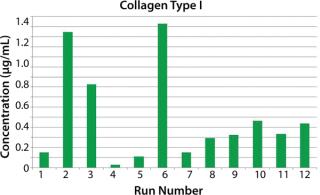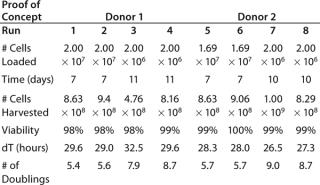The large numbers of ex vivo expanded cells that are required in many clinical cell therapy protocols (>100 million per patient) make standard culture conditions problematic and expensive, resulting from the need for extensive personnel and facilities resources and the high potential of contamination. To meet such clinical demand, a robust, automated, and closed cell-expansion method is optimal. The Quantum Cell Expansion System (CES) is a functionally closed, automated, hollow-fiber bioreactor system designed to reproducibly grow both adherent and suspension cells in either GMP or research laboratory environments. The Quantum CES has successfully been used for the ex vivo expansion of clinical-scale quantities of adult bone marrow–derived mesenchymal stem cells (MSCs). It has now been demonstrated that a second adherent cell type of clinical interest, adult normal human dermal fibroblasts (NHDF), are ex vivo expandable with the Quantum CES.
Methods
NHDF from two different donors were cultured at two different starting densities in the Quantum CES using the Cloneticsâ„¢ Fibroblast Growth Medium-2 (FGMâ„¢-2, Lonza) supplemented with 10% fetal bovine serum (FBS). The feed method was by perfusion with a starting rate of 0.1 mL/min. Feed rates were doubled beginning on day 3 and every day thereafter until harvest for runs 1, 2, 5, and 6. Feed rates were doubled on day 3, day 6, and day 10 for runs 3 and 4. Feed rates were doubled on day 4, day 5, day 7, and day 10 for runs 7 and 8. T25 control flasks received media exchanges every two days and the volume of media was increased as confluency increased. Donor 1 was harvested from the Quantum CES when the T25 control flasks reached 80% confluency. Donor 2 was harvested from the Quantum CES when the T25 control flasks reached 90% confluency.
Table 1: Harvest results of the proof-of-concept runs; harvest concentration and viability were obtained by the Vi-CELL® Cell Viability Analyzer (Beckman Coulter)
Results
NHDF were successfully expanded in the Quantum CES with cells yields above 800 million, except for run 3 with 476 million cells.
Author Details
Boah Vang, Michelle Brecheisen, Nathan Frank, and Thomas Startz are laboratory scientists; Rebecca Peters is a laboratory supervisor; and Kim Nguyen is head of R&D at Terumo BCT, 10810 West Collins Avenue, Lakewood, CO.




